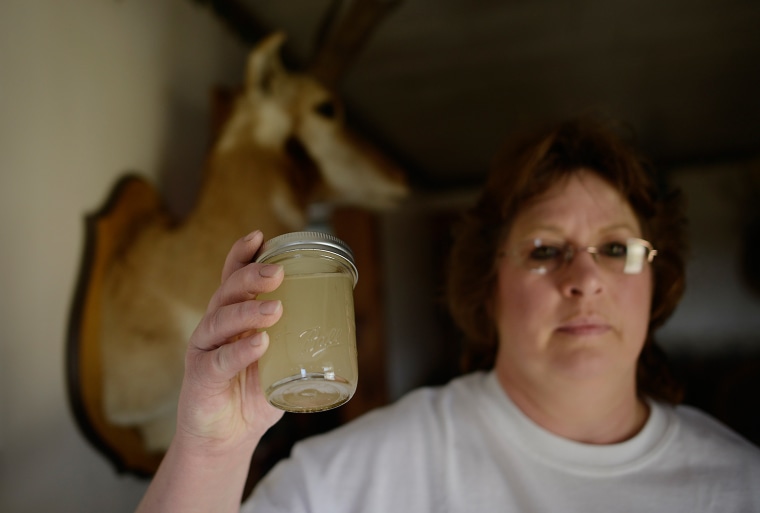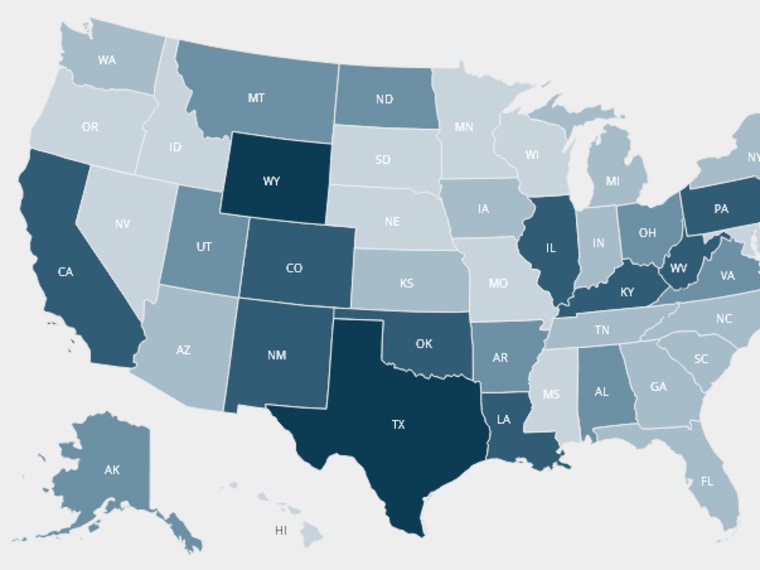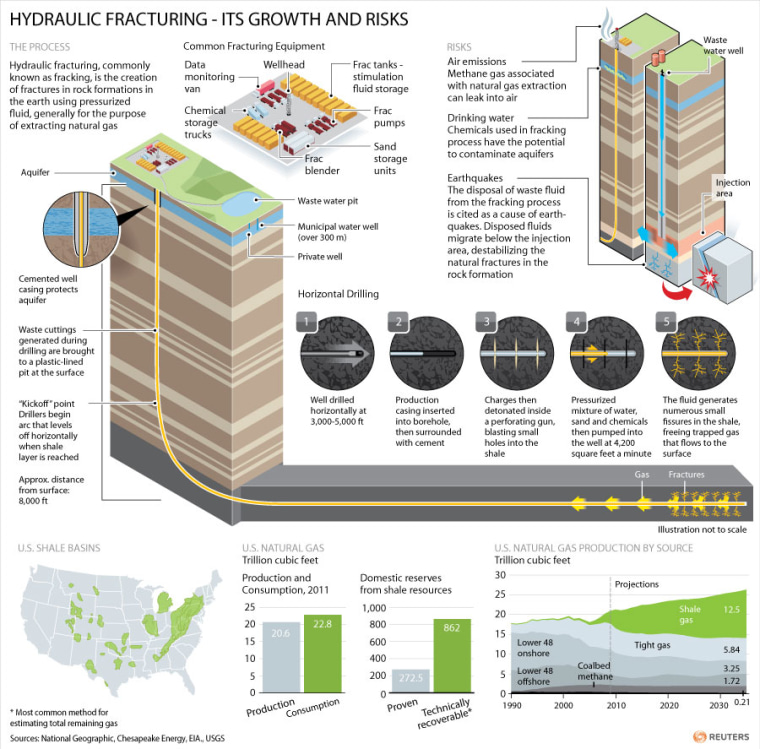
Bill Dedman, NBC News, and Karen Weintraub
BRADFORD COUNTY, Pa. — Carol French still has the canning jar full of cloudy and gelatinous water that came out of her well right before her daughter got sick and some of her 40 milk cows developed a rash. She agrees that this jar, by itself, proves nothing about the environmental impact of "fracking," the drilling technology largely responsible for America's boom in oil and gas production. You can't determine the environmental effects of drilling and fracking from one person's Mason jar full of water.
"I can't say it's definitely from the drilling, but there's strong circumstantial evidence," French said, referring to nearby natural gas drilling using fracking.
Making that direct connection often isn't possible even with 1,100 jars. That's how many examples are on a "list of the harmed," people who have offered personal stories of harm from fracking, as tallied by the advocacy group Pennsylvania Alliance for Clean Water and Air.
Beyond such anecdotes, many facts about fracking's impact on the environment remain hotly contested. Consequences like water contamination have been established, but often it is not clear if they were directly caused by fracking or the result of sloppy drilling practices.
Meanwhile, the scientific studies that do exist suggest there are inconvenient truths for both sides of the fracking debate to confront.
The biggest hurdle for the pro-industry side: The rapid expansion of fracking over the last five years has resulted in confirmed cases of drinking water contamination, a house explosion, and air pollution.
But for those who oppose fracking, there is this: Burning the natural gas produced by fracking may be much better for the environment and public health, over the long run, than burning coal.
As detailed in the first three installments of Power Shift, an NBC News/CNBC special report, the United States is experiencing an energy boom created by new drilling technologies that have unlocked vast domestic oil and natural gas reserves. Proponents of fracking praise its economic benefits, while many foreign policy experts say this developing energy independence may give the U.S. new leverage in world affairs.
Many experts say that concern about the environmental consequences of fracking and other new drilling technologies may be the biggest obstacle to the continued growth of this newfound domestic energy supply.
The future of the industry may depend on whether more cases of environmental damage are documented, and whether they are regarded as unlikely accidents or the inevitable consequence of this expanding search for energy resources. That could, in turn, lead to stricter regulation that could slow or halt new drilling.

For now, your view of the energy boom may depend on whether drilling and fracking are happening in your back yard, as they have been in Carol French's back yard in northeast Pennsylvania since 2008. Bradford County is the busiest fracking county in the state. Just across the border, in New York, Gov. Andrew Cuomo is considering whether or not to allow fracking, which he says would take place only under "toughest-in-the-nation" environmental regulations. Much of the countryside in both states sits above the Marcellus Shale, the gas-rich band of rock that stretches to Ohio and West Virginia.
Water issues are in dispute To get the natural gas out of crevices deep underground, companies must pump in vast quantities of water and sand, under enough pressure to fracture rock and release the gas trapped inside. Also in the slurry that comes back up as waste water: toxic chemicals, including some that cause cancer, damage the nervous system, disrupt hormones and mutate genes. And those are just the ones we know about. Oil and gas companies in some states haven’t been compelled to say what’s in their brew, so some don’t.
The companies say the health risks are minimal. As of August 2011, oil and gas companies still said there had never been a documented case of drinking water contaminated by fracking. (The industry claim may still technically be true, using the industry definition of "fracking" to refer only to the process that happens after the drill hole is dug, not the drilling activities necessary before the fracking can occur.)

The first blemish on the industry's clean record came in a New York Times article documenting such a case from the 1980s. (Demonstration projects for hydraulic fracking began decades earlier in the U.S., though it didn't become common until the early 2000s.) Then came the most-publicized case of well-water contamination near fracking operations, in Dimock Township, Pa., just east of Bradford County; the federal Environmental Protection Agency said in 2012 that preliminary results found the water was safe to drink, though it did contain chemicals as well as explosive methane. Those results have been debated. The nonprofit investigative news organization Pro Publica has reported numerous confirmed health and safety problems related to drilling and fracking, including a house explosion near Cleveland, Ohio, after gas leaked into the home's water well.
Fracking is now regulated almost entirely by the states, though the EPA is slowly moving toward federal regulation. In the meantime, government has only lightly tapped the brakes to tighten regulation of the industry.
Drinking water contamination has been the biggest public relations problem for the industry. But the contaminants can come from several sources: from the hydraulic fracturing process itself, from the waste water, from the pits where drilling chemicals are stored, or from transporting chemicals and wastewater. The industry says that examples of contamination are very rare. Lisa Jackson, who was then then the EPA administrator, echoed the industry position that problems aren't systemic to fracking. "If you get a bad operator in there, somebody who’s not responsible, who’s not seeing how important it is to get this right, they can contaminate an aquifer," she said in a June 2011 talk. Environmentalists argue that pollution is an unavoidable part of the drilling process, not the result of shoddy practices.
It’s theoretically possible, though unproven, that some of the tainted water and dangerous gases might travel through deep underground crevices to unexpected places, such as the aquifers used for private wells and community water supplies. A July 2012 study by researchers at Duke University and California State Polytechnic University at Pomona found that salty water from deep underground could make its way into drinking water near the surface.
At the surface, there have also been outright accidents, leaking oil and toxins. Well casings have cracked, and sometimes pumping in more concrete for a "squeeze job" to stop the escaping water and chemicals won't stop the damage.
In Bradford County, the pleasant pond at the vacation home of Truman and Bonnie Burnett is a murky swamp, ringed by dead trees, after tens of thousands of gallons of drilling fluid spilled in 2009 from the property of their neighbor, who had signed a gas lease. His wife won't come back to their vacation home anymore, Truman Burnett says, so he has nailed a framed photo of her on a tree.
An industry lobbying group in North Dakota, where fracking is common, said the industry is doing what it can, but some mistakes are inevitable.
"You're going to have spills when you have more activity," Ron Ness, president of the North Dakota Petroleum Council, told a reporter with the investigative journalism organization Pro Publica, which documented more than 1,000 accidental oil spills in North Dakota in 2011.
Related story
Sorting through the claims, counterclaims about environmental impact of 'fracking,'
Advice for a neighbor"Our water changed on March 15, 2011," said Carol French, the dairy farmer, a few months after the drilling began in December 2010. What remains unclear is whether health issues experienced by her daughter and some of her cows afterward were caused by the turbid tapwater.
"My daughter was 24 at the time," French said. "She had a high fever for three days. I thought she had the flu. She had stabbing pains in her abdomen, and diarrhea. ... When I took her to the emergency room they checked her urine and blood to only find that the white blood cell count was high in her urine not in her blood. They then did a MRI to find that she had 'free floating fluid' in her abdomen, and her spleen, liver, and right ovary were enlarged. They didn't know what was wrong with her."
Then her daughter went to stay with a friend while looking for work. "Nine days later, all symptoms were gone and she was acting like herself," her mother said.
When she came back to visit, the symptoms returned. "When I would visit my daughter, my rashes would disappear, but return within five days after returning to my home. Our cattle seem to have breeding problems, but I can't say it's strictly due to my water changing without tests being done."
Now she has bad water a few times a month. When the tap water gets cloudy, she drives around to the nine gas well pads within a mile of her farm, writing down which ones have trucks and men working. She agrees that alone is a fruitless way of identifying a cause.
She hasn't tested her water yet; nor has the state Department of Environmental Protection. They've been squabbling over the rules of how to test and whether the state will act if the results implicate the fracking operations. It's going to cost her $3,200 to get a lab to test for all the acids, detergents and poisons that companies say they use for fracking – or hydraulic fracturing – to break up underground shale and remove oil and natural gas.
Meanwhile, she tests her water for coliform and E. coli bacteria, meeting USDA and FDA standards for a dairy operation, and she ships the milk off to America's food supply.
No studies have found fracking chemicals have entered the food chain. Two Cornell University researchers have reported health impacts on cattle near drilling operations, but industry backers called the study "deeply flawed."
French started out as a supporter of fracking. She signed her own gas lease to allow fracking on the farm near Ulster, pocketing $13,600 starting back in 2006, but no company drilled on her land. Now she questions the economic benefits of fracking and worries about the environmental consequences.
"The standards of yesteryear," she said, "do not meet the industrial activities surrounding us. Like my milk inspector told me, 'You cannot find something you are not looking for.'"
A lot of her neighbors in the county, however, have put serious money in their pockets.
Among them is Robert "Bob" Wilmot, a former pipefitter who was able to rebuild a bed and breakfast he runs with his wife ("the best cook in the county," he says) in the small Bradford County town of Rome. He got $5 an acre for a gas lease on his 250-plus acres, then $75,000 more to let the gas company turn his hay field into a pond, and another $25,000 to allow a pipeline. Everyone in the county has heard stories of people making hundreds of thousands, even millions for one of the big compressor stations that send the gas down the pipeline. When the gas rush began here, churches put up signs such as "Thank God the gas companies are here."
Wilmot says he has confidence in the gas companies, and if anything he believes the state regulators are too tough.
But Wilmot does have a few reservations. Asked what advice would he offer to the people ten miles up the road in New York, which is considering fracking, he replied.
"I'd go ahead. I wouldn't be in favor of putting fracking over by the Finger Lakes. That's a beautiful area. You can't replace them lakes."
Bill Dedman is an investigative reporter for NBC News; he reported from Pennsylvania. Karen Weintraub is a freelance health and science reporter in Boston.
More from Power Shift, an NBC News/CNBC special report:
Part 1: Energy boom dawning in America